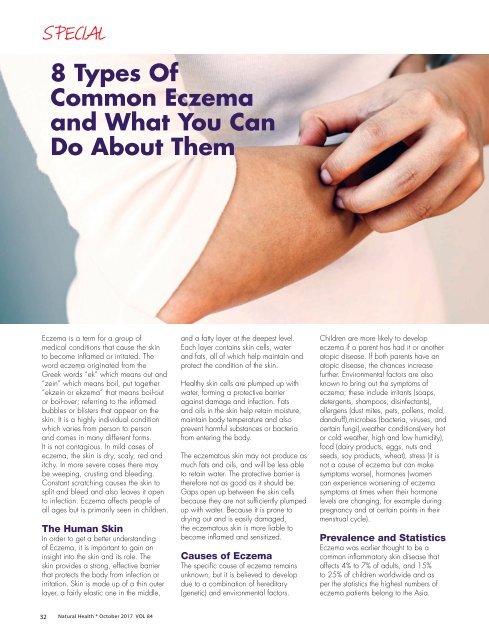Natural Health October 2017
Create successful ePaper yourself
Turn your PDF publications into a flip-book with our unique Google optimized e-Paper software.
SPECIAL<br />
8 Types Of<br />
Common Eczema<br />
and What You Can<br />
Do About Them<br />
Eczema is a term for a group of<br />
medical conditions that cause the skin<br />
to become inflamed or irritated. The<br />
word eczema originated from the<br />
Greek words “ek” which means out and<br />
“zein” which means boil, put together<br />
“ekzein or ekzema” that means boil-out<br />
or boil-over; referring to the inflamed<br />
bubbles or blisters that appear on the<br />
skin. It is a highly individual condition<br />
which varies from person to person<br />
and comes in many different forms.<br />
It is not contagious. In mild cases of<br />
eczema, the skin is dry, scaly, red and<br />
itchy. In more severe cases there may<br />
be weeping, crusting and bleeding.<br />
Constant scratching causes the skin to<br />
split and bleed and also leaves it open<br />
to infection. Eczema affects people of<br />
all ages but is primarily seen in children.<br />
The Human Skin<br />
In order to get a better understanding<br />
of Eczema, it is important to gain an<br />
insight into the skin and its role. The<br />
skin provides a strong, effective barrier<br />
that protects the body from infection or<br />
irritation. Skin is made up of a thin outer<br />
layer, a fairly elastic one in the middle,<br />
and a fatty layer at the deepest level.<br />
Each layer contains skin cells, water<br />
and fats, all of which help maintain and<br />
protect the condition of the skin.<br />
<strong>Health</strong>y skin cells are plumped up with<br />
water, forming a protective barrier<br />
against damage and infection. Fats<br />
and oils in the skin help retain moisture,<br />
maintain body temperature and also<br />
prevent harmful substances or bacteria<br />
from entering the body.<br />
The eczematous skin may not produce as<br />
much fats and oils, and will be less able<br />
to retain water. The protective barrier is<br />
therefore not as good as it should be.<br />
Gaps open up between the skin cells<br />
because they are not sufficiently plumped<br />
up with water. Because it is prone to<br />
drying out and is easily damaged,<br />
the eczematous skin is more liable to<br />
become inflamed and sensitized.<br />
Causes of Eczema<br />
The specific cause of eczema remains<br />
unknown, but it is believed to develop<br />
due to a combination of hereditary<br />
(genetic) and environmental factors.<br />
Children are more likely to develop<br />
eczema if a parent has had it or another<br />
atopic disease. If both parents have an<br />
atopic disease, the chances increase<br />
further. Environmental factors are also<br />
known to bring out the symptoms of<br />
eczema; these include irritants (soaps,<br />
detergents, shampoos, disinfectants),<br />
allergens (dust mites, pets, pollens, mold,<br />
dandruff),microbes (bacteria, viruses, and<br />
certain fungi),weather conditions(very hot<br />
or cold weather, high and low humidity),<br />
food (dairy products, eggs, nuts and<br />
seeds, soy products, wheat), stress (it is<br />
not a cause of eczema but can make<br />
symptoms worse), hormones (women<br />
can experience worsening of eczema<br />
symptoms at times when their hormone<br />
levels are changing, for example during<br />
pregnancy and at certain points in their<br />
menstrual cycle).<br />
Prevalence and Statistics<br />
Eczema was earlier thought to be a<br />
common inflammatory skin disease that<br />
affects 4% to 7% of adults, and 15%<br />
to 25% of children worldwide and as<br />
per the statistics the highest numbers of<br />
eczema patients belong to the Asia.<br />
32 <strong>Natural</strong> <strong>Health</strong> * <strong>October</strong> <strong>2017</strong> VOL 84

















